We have been told for years to hydrate, hydrate, and hydrate ourselves some more, and yet some of us just haven’t gotten to where we need to be while drinking what seems like endless amounts of water. How critical is hydration for our health? In this week’s issue of the Medical Underground, we are going to take a “deep dive” into water (no pun intended).
How Much Water Should I Drink?
First of all, let me tell you unequivocally that most adults are under hydrated or chronically dehydrated. The problem worsens as we age, simply because our normal thirst mechanism (our trigger to drink water) declines with age.
Old folks are almost never thirsty. Consequently, most elderly patients of mine come in every visit dehydrated, not enough to land them in the hospital, but enough to impact their renal (kidney) function.
Even when I tell them constantly to increase their water intake, rarely do they drink enough to make a positive clinical impact. They always are confused as to what exactly is enough. Further down this article I will give you the recommended amount of water to drink to remain hydrated. First, I want to give you some thoughts to consider.
The Snack Trap
Be aware that nighttime snacking, especially on carbohydrates and sugary snacks will increase your glucose and in turn your insulin level. Insulin causes increased urination. So, my very unpopular message to you is no nighttime snacks if you want to control your nocturia.
As always, the human body never ceases to amaze me. Our kidneys, for example, control our urination on a biological clock or what is medically known as a circadian rhythm. The kidney actively produces urine all day and at night, shuts down its activity to allow sleep as well as a restful period for the kidneys. It produces antidiuretic hormones that inhibit urine production. The human body, what an amazing machine.
How Can I Tell If I am Hydrated?
Check your Tongue
After almost 40 years in clinical practice, I have learned a few things and one of them is that you must give patients concrete, simple examples. For that reason, I always tell my patients to look at their tongues. If your tongue is not wet, but dry and raspy like a cat’s tongue, not shining but dull, then you are dehydrated and need to drink more water until your tongue is wet and shiny appearing.
The amount of water you need to drink depends on many factors including your size, your physical activity, the environmental temperature, your medications, and your underlying health.
Note: Dehydration many times is not related solely to water intake. Water losses also come into play. For example, if you have severe diarrhea or nausea and repeated vomiting, this could easily lead to dehydration from your fluid losses.
This is further compounded by a lack of intake, especially if you are vomiting, the last thing you feel like doing is drinking. Diarrhea with its accompanying dehydration is especially deadly for children and is one of their greatest killers worldwide.
Check Your Urine
Another very reliable method of determining if you are hydrated enough is by the color of your urine. If you are well hydrated your urine should be almost clear in color with just the faintest yellow tinting to it.
When you are dehydrated your urine becomes more concentrated, since your kidneys are eliminating water soluble waste that is not diluted enough, hence its dark color. The darker the urine, the worse your hydration.
Using your urine as a barometer of your hydration is very accurate, and once you get accustomed to it, you will find it quite easy. Now that being said, be advised that other factors may change the color of your urine bright yellow, such as taking B vitamins.
Since B vitamins are water soluble, that means they dissolve in urine, that is how they are excreted. So, if you take in more than your body needs, you will urinate it out. That is not a problem and does not injure your kidney, it is only problematic if you are gauging your hydration by your urine color.
Note: if you are taking diuretics (water pills), such as Lasix (furosemide), Bumex (bumetanide), hydrochlorothiazide, Aldactone (spironolactone), and Maxzide, this naturally will increase your urination and dilute your urine, so using urine color to determine your hydration will be inaccurate.
Kinky Fact/Nerd Food: Remember that the most popular stimulant in the world, caffeine, is also a diuretic and will increase your urination. Caffeine is naturally found in coffee, but also in green and black tea (not herbal teas), colas, chocolate, energy drinks, Dr. Pepper, and Mountain Dew.
The caffeine content of different varieties of coffee also varies dramatically, check out this chart for some startling differences.
Kinky Fact/Nerd Food: The drug Pyridium (phenazopyridine) which is a water-soluble analgesic (pain killer) is used by docs when there is pain or burning in the urinary tract. It is excreted by the kidney and numbs up the urinary tract. It also has the side effect of turning your urine orange/red in color. I always jokingly reassure patients that if they see their urine turn orange, they are not rusting. It’s over the counter name is Azo. However, I digress, let’s get back to hydration.
Skin Tenting
Another method that is taught in medical school is testing the elasticity of your skin. Normally, in someone well hydrated, if you pinch a piece of skin between your fingers, it will form a “tent” (a little raised triangle of skin), that will snap back to flat in a few seconds.
If, however, you are dehydrated (especially in the elderly), the “tent” of skin will remain elevated for more than five seconds. This is okay as a test, not completely reliable, because of various factors including the age of your skin and the tightness of your muscles below your skin, not just your hydration. But, as a rule it is helpful in determining your hydration.
Rules of Thumb for Hydration
Hydration is critical for maintaining good health. If you ignore it, you do so at your own peril, and very soon you will be dehydrated and an entire cascade of problems accompany it.
Hydrating yourself aggressively is the only remedy for dehydration. Obviously, if you are in the sun, the sooner you get into shade the less water you will lose. Here are some of the immediate benefits of hydration.
How you drink water can multiply its benefits. For example, here are some of the benefits of drinking water upon awakening.
Another way to multiply the benefits of drinking water is squeezing lemons into your water. Adding lemon juice to your water first thing in the morning is another good health hack further multiplying the benefits. Lemons add a multitude of benefits such as:
One of the greatest benefits in my humble opinion of adding lemon juice to water is its wonderful effect on kidney stones. The citric acid in lemon juice combines and neutralizes calcium oxalate which causes the vast majority of kidney stones. As a matter of fact the remaining kidney stones are uric acid stones and lemon juice helps dissolve them as well and helps gout.
One other benefit not mentioned is its potassium content, which is a good thing, as well as vitamin C to help boost the immune system.
How The Medical Underground Adequately Hydrates
In general, an average sized adult in mild weather, with normal exertion will need about two liters of water daily, that translates to four small water bottles a day. That water should be drunk throughout the day, to keep your kidneys evenly hydrated so they can get rid of all that water soluble waste from your body.
If you hydrate a lot at the end of the day, you will most likely have to get up at night to urinate, especially if you are middle aged or elderly.
A good way to gauge this is for the average sized adult doing normal activities, at a normal temperature should try to drink 8 ounces of water an hour, for the first ten or so hours they are awake. So, if you get up at 7 in the morning, you should be done hydrating by 5 p.m. This will minimize nocturia (getting up at night to urinate) and will also provide water to your body when it needs it, while awake and active more than at nighttime when your needs markedly diminish.
You can avoid excessive nocturia by hydrating well during the day, so you are not thirsty and drinking late in the day, no more than eight ounces max of fluids should be drank during the early evening, this will help minimize your bathroom trips. You should note that getting up once or even twice a night is pretty much normal for most people, very few folks sleep through the night without one bathroom trip.
Remaining well hydrated has to become a lifestyle if you want to remain in good health and give your body what it so desperately needs, clean water. Remember to use your tongue as a barometer of your hydration, if it is dry, keep hydrating yourself until it is wet.
I will end this article with two quotes that just cannot be improved upon.
As always, I hope you enjoyed this week’s article. If you are not a subscriber, then please consider becoming one. If you are a free subscriber and you enjoy the content I deliver to you weekly, then please help support my work and become a paid subscriber. It is only a few bucks a month and will show me your appreciation.
Until next time, may God bless you and your family and the United States of America, as we are sure heading into hard times. If you believe in God, Miracle Shall Follow Miracle and Wonders Shall Never Cease.
This disclaimer provides that such medical information is merely information – not advice.
If users need medical advice, they should consult their doctor or other appropriate medical professional.
***Copyright © 2023 by Dr. Ralph La Guardia, MD
All rights reserved. This article or any portion thereof
may not be reproduced or used in any manner whatsoever
without the express written permission of the publisher
except for the use of brief quotations in an article review.





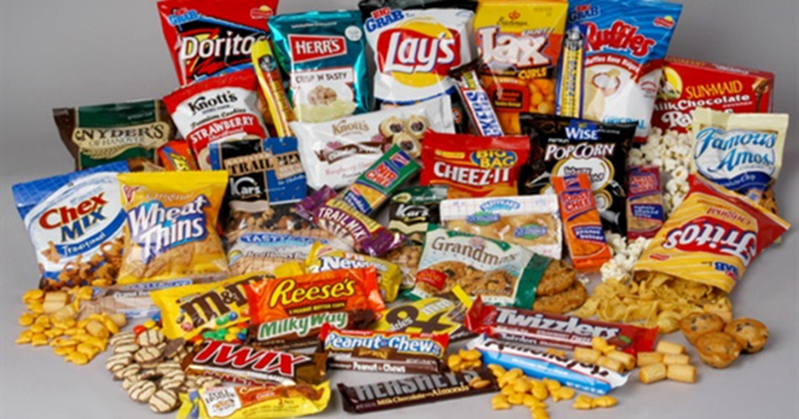




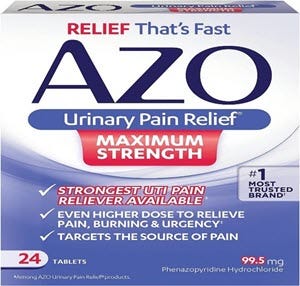


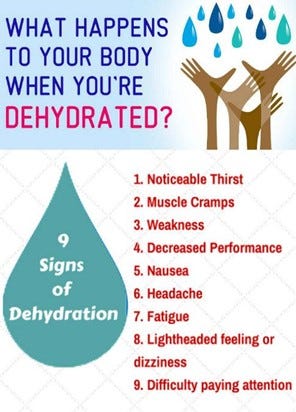



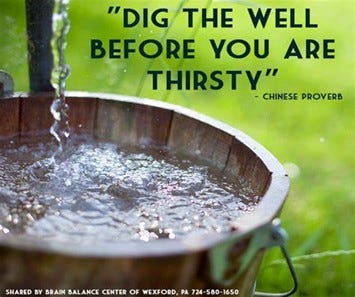

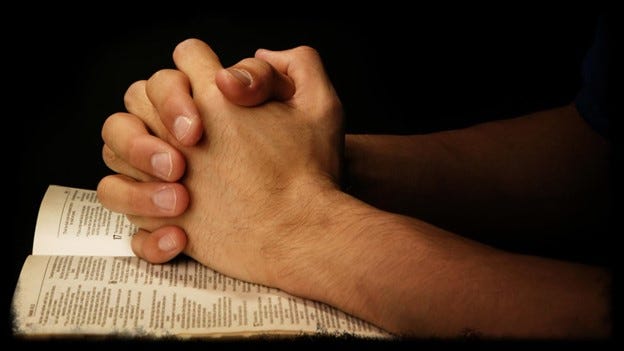
This article explains very well about how much water is needed to hydrate and also explains between what hours to hydrate to reduce urination during the middle of the night.